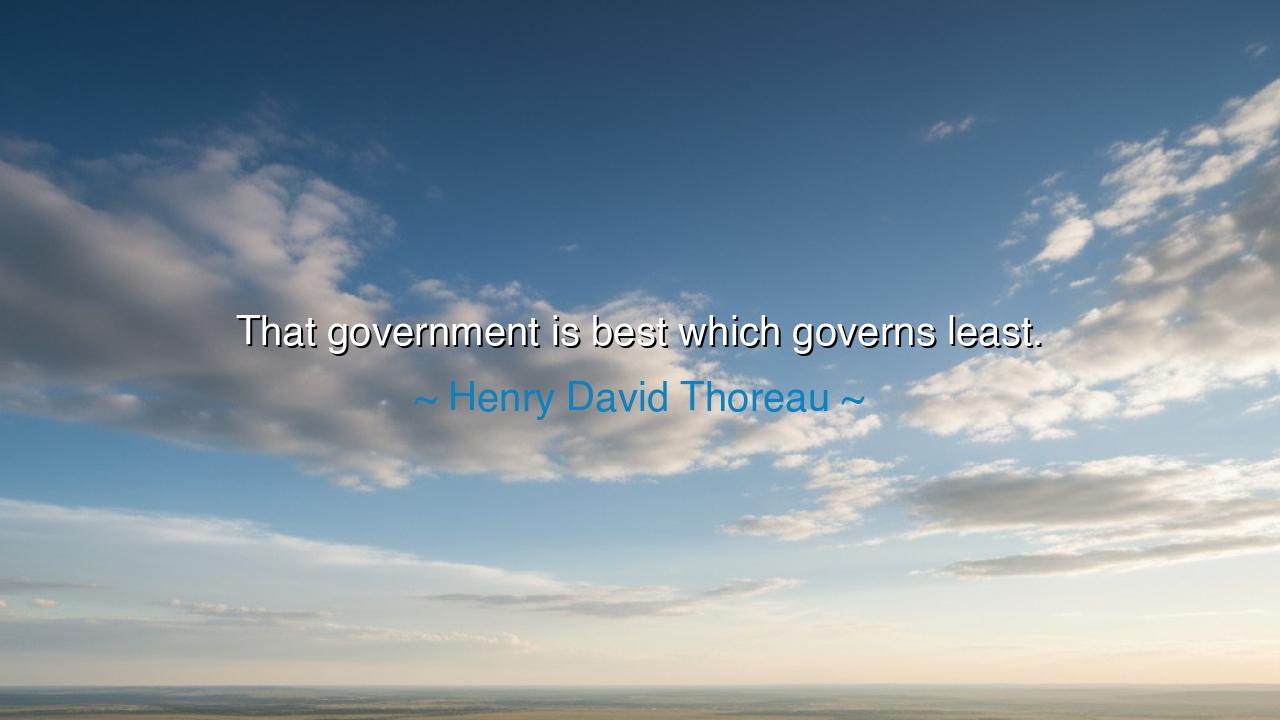
That government is best which governs least.






"That government is best which governs least." Thus spoke Henry David Thoreau, the philosopher of conscience and simplicity, whose life and words remain a torch for all who cherish liberty of the soul. In this short yet mighty phrase, Thoreau distills the essence of self-reliance, the ancient ideal that freedom is not the gift of rulers but the birthright of every human being. His words are not a cry for chaos, but a call for conscience over control, for virtue over authority. They remind us that the truest order in human life is not imposed by decree, but born from the integrity of individuals who govern themselves.
Thoreau first wrote these words in his essay “Civil Disobedience,” penned in 1849 after his brief imprisonment for refusing to pay taxes that funded the Mexican-American War — a conflict he viewed as unjust. In his cell, stripped of possessions yet filled with peace, Thoreau came to a profound realization: that the moral authority of government depends entirely upon the virtue of those it governs. A government that overreaches — that interferes in every aspect of life — becomes not a protector of freedom, but its thief. “That government is best which governs least,” he declared, because the highest aim of society should be to cultivate individuals so just, so responsible, that they scarcely need to be governed at all.
The meaning of Thoreau’s declaration lies not in hatred of government, but in reverence for liberty. He saw that institutions, like men, grow corrupt when they wield too much power. A government that assumes to know what is best for its people often ends by treating them as children — or worse, as subjects. Yet Thoreau believed that when men and women live by conscience, guided by reason and compassion, external control becomes unnecessary. The ideal society is not one of rigid laws and rulers, but one where every heart is a law unto itself — where the flame of individual morality burns so brightly that tyranny finds no shadow to dwell in.
History has shown the wisdom of his words again and again. Consider the fall of imperial Rome, whose vast bureaucracy sought to regulate every province, every trade, every life. What began as a republic of virtue became an empire of decrees, drowning in its own laws until liberty suffocated beneath the weight of its own administration. Or look to more recent times: the revolutions of the eighteenth and nineteenth centuries, when nations cast off kings and monarchs not because they despised order, but because they longed for self-government — for the dignity of shaping their own destiny. Wherever people have risen against oppression, Thoreau’s spirit has risen with them.
Yet his wisdom also carries a warning for the modern age. For even in democratic lands, the temptation to rely on government for every solution grows stronger with each passing generation. The citizen forgets his own strength and waits for the state to act in his place. Thoreau saw that dependence, even in the name of comfort, is a subtle form of slavery. When we yield our will to the machinery of authority — when we look to laws instead of virtue, or to officials instead of ourselves — we surrender the very freedom our ancestors fought to gain. The chains may be invisible, but they are no less binding.
But Thoreau was not a destroyer; he was a builder of conscience. He dreamed of a government so light, so pure, that it would rest upon the goodwill and wisdom of the governed. “When men are prepared for it,” he wrote, “they will have a government that governs not at all.” This is not anarchy, but the perfection of democracy — the state of society in which men and women, guided by inner justice, require no master but the truth within. Such a vision demands more than rebellion; it demands responsibility. Freedom is not the absence of order, but the triumph of self-discipline.
The lesson, then, is this: to create a world with less need of government, we must first govern ourselves. Cultivate honesty, courage, and compassion in your own life. Do not wait for leaders to compel you toward what you already know is right. Act with justice even when no law commands it. Serve others not because you are told to, but because you are moved by the quiet voice of conscience. For when the people are strong in virtue, the state need not be strong in control.
So remember the wisdom of Henry David Thoreau, the hermit of Walden Pond and prophet of the free spirit: “That government is best which governs least.” His words are not a dismissal of society, but a summons to moral awakening. They call upon every soul to take up the work of liberty within, so that tyranny without may vanish. When men and women learn to be their own rulers — wise, humble, and just — then the dream of a world governed least shall not be a dream at all, but a living reality, shining like dawn over a free and self-governing people.






AAdministratorAdministrator
Welcome, honored guests. Please leave a comment, we will respond soon